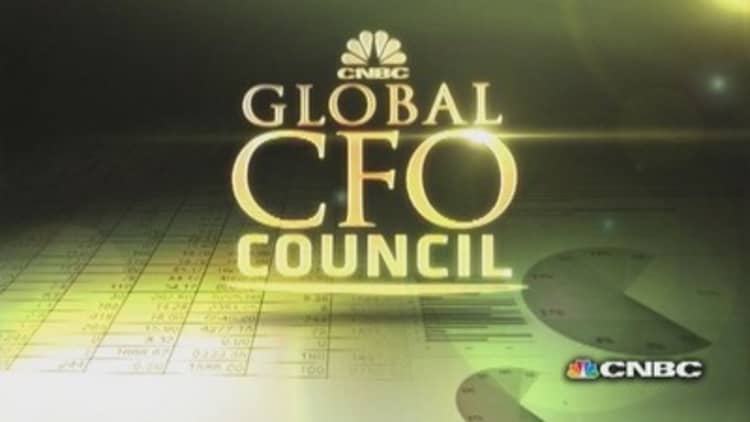
The long, cold, snowy winter and recent market shivers have chilled the confidence level of the CNBC Global CFO Council, a group managing more than $2 trillion in market capitalization from both public and private companies.
In the latest poll, the number of CFOs who view the U.S. economy as improving at least moderately fell by 15 percentage points from December, to 67 percent from 82 percent. Still, less than 6 percent think the economy is declining.
The CNBC Global CFO Council is mixed on the winter's long-term impact. Not a single member said the unusually cold and snowy weather was the leading cause of the S&P 500's 3.5 percent drop in January. Instead, 56 percent attributed the drop to profit-taking, while 22 percent blamed emerging markets.
The CFOs were split over the extreme weather's potential impact on their companies' full-year earnings. Thirty-three percent said it would have a negative impact, 50 percent said it would have no impact, and 11 percent said the effect would be positive.
The Cyber Threat
Other top-of-mind issues include concerns about cybersecurity and the consequences of a rise in the minimum wage.
Cybersecurity is getting more attention from the C-suite following huge data breaches at Target and Neiman Marcus during the Christmas season. Thirty-nine percent of CFOs cited cyberthreats as one of the three largest external risks their companies face, versus 29 percent in early December. That figure has been moving up steadily—it was 21 percent in the March 2013 poll.
Companies are looking to take action against such risks this year as part of an increase in spending on information technology. Thirty-nine percent of CFOs ranked IT as their top spending priority for 2014, and 89 percent placed it in the top three. Research and development is also a high spending priority, as are new equipment purchases.
The Global CFO Council also weighed in on the Obama administration's recent push to raise the federal minimum wage to $10.10 an hour. Exactly one-third of the CFOs said they support the Congress increase, one-third opposing it and one-third neutral.
CFOs gave a wide variety of answers when asked what they personally would consider an appropriate minimum wage. Half of them said the wage should be $9.50 or higher, 16.6 percent said it should be $8, and 11.1 percent said the current federal minimum wage of $7.25 per hour is appropriate.
Others objected to the question entirely. One CFO called for "higher job tax credits to companies who hire workers" instead of a wage hike, and another said we should "let the market decide any amount higher than the current rate."
—By David Spiegel, Editorial Manager, CNBC Digital
The full results of this year's first CNBC Global CFO Council survey can be found below.





